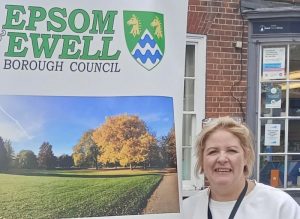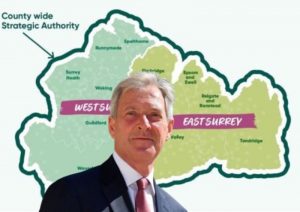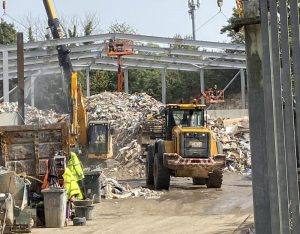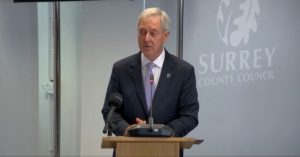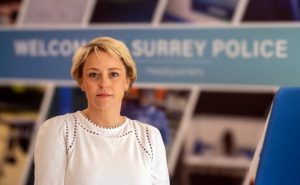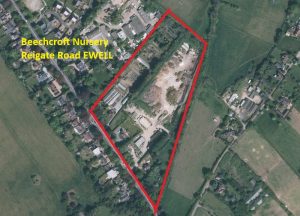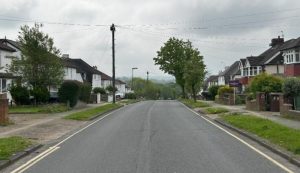Plans to retrospectively approve changes at a controversial waste and recycling site near Epsom have been refused, following years of complaints from residents about noise, dust and early-morning lorry movements.
Surrey County Council’s planning committee voted to reject the application for land at the Chalk Pit on College Road, where skip hire firm Skip It Epsom Ltd operates, at a meeting on December 17.
Residents speaking at the meeting and objecting to the scheme online slammed the plans. They described how the site had been “destroying their lives” and making it a misery with constant noise, intruding on their home life and impacting nearby schools. Locals complained that site has not been built according to its planning permission.
The application was not for a brand-new site, but to regularise changes that had already been made to buildings and operations at the former waste transfer station, which was granted permission in 2023 to become a materials recycling facility.
However, councillors were told the development had not been built as approved and crucially, a required drainage system was never installed.
The operator wanted permission to change several conditions attached to the original approval, including:
- Buildings being built on a different footprint and with altered materials
- A new entrance and staircase
- Moving noisy waste-sorting machinery into a different building
- Changes to HGV parking and electric vehicle charging points
Officers described most of these changes as relatively minor and, on their own, acceptable even though the site sits in the Green Belt.
So why was it rejected? The refusal came down to one major issue: drainage. Councillors heard that the surface water drainage scheme approved in 2023 had never been installed, and that new assessments now showed a much larger soakaway was needed.
But part of the required drainage system would sit outside the application site, meaning it could not legally be approved or enforced through this planning application.
As a result, officers said an essential planning condition could no longer be met or reimposed, leaving the council with no option but to recommend refusal.
Local residents spoke passionately against the application at the meeting, describing years of disruption since operations ramped up in 2020.
Bernie Muir, local councillor for Epsom, told the committee that the site had been “destroying lives for five years”. She said: “People can’t use their gardens, open windows or work from home […] There are serious mental health impacts from the constant noise.”
More than 170 objections were submitted overall. Residents complained of:
- Banging, clanging and crashing from skips being dropped
- Heavy lorries arriving as early as 5.30am
- Dust, light pollution and breaches of operating hours
- Noise carrying across the landscape due to the bowl-shaped chalk pit
Fiona, who lives around 350 metres from the site, said she had no problems for years after moving to the area until operations changed. “On some days the noise I experience in my garden is banging, clanging and repetitive crashing,” she said.
She also raised concerns about drainage, saying the site sits near a protected groundwater zone and the chalk geology is highly porous. “This is an unfixable flaw,” said John Beckett, an Epsom and Ewell borough council member.
Residents’ groups also argued that moving noisy machinery and changing the building entrance had directed sound towards homes that were never properly assessed in earlier reports.
Speaking for the applicant, a representative said she was aware of concerns but claimed the developer had not been invited to some of the multi-agency meetings.
Cllr Tim Hall said he was “surprised” by the claim, given the number of meetings held with residents, agencies and council officers over five years.
The applicant’s agent defended the criticism by describing the chalk pit as a “very busy site” and it is difficult to keep all the workers across the procedures to keep the doors closed and noise down. She also said the early starts referred to residents were “alleged breaches on the site” and the noise could be coming from elsewhere nearby.
Some councillors acknowledged residents’ frustrations, while others pointed out the site has long been industrial. Cllr Ernest Mallett MBE said: “At the end of the day, people bought houses next to an industrial site.” But others felt the problems went beyond normal industrial impact.
The refusal does not shut the site down but it does mean the unauthorised changes cannot be approved. To move forward, the operator would need to submit a new full planning application, including a drainage solution that can be properly assessed and enforced.
Emily Dalton LDRS
Related reports:
A question of Chalk Pit noise and dust
Chalk Pit action – a tale of two committees
Chalk Pit debate deferred by late abatement
Will the dust ever settle on Chalk Pit conflict?
“Heat and Dust” epic in Epsom


